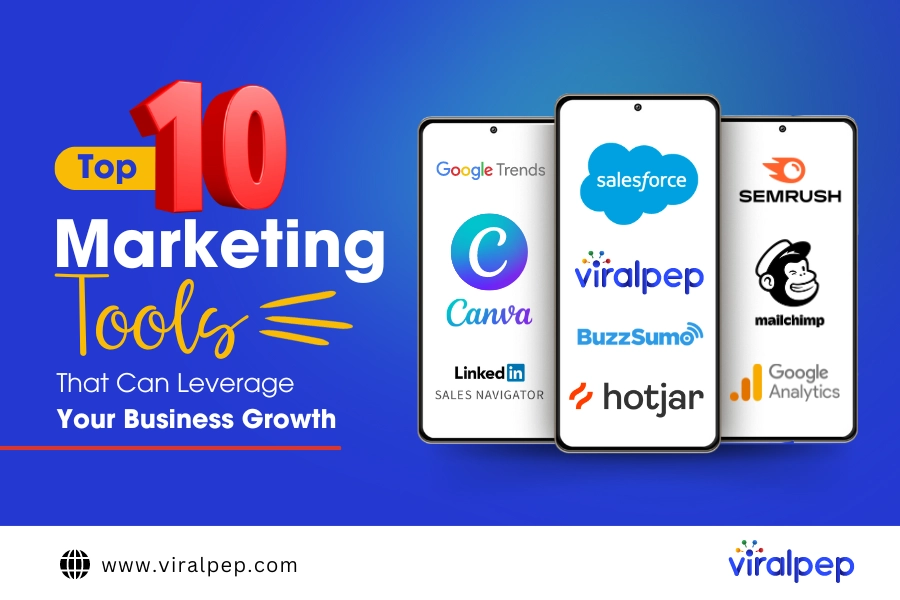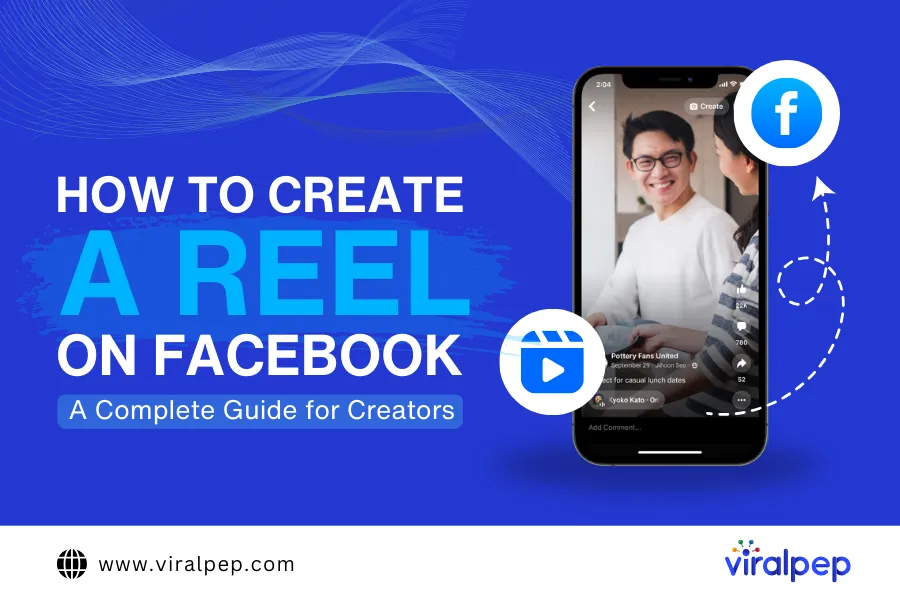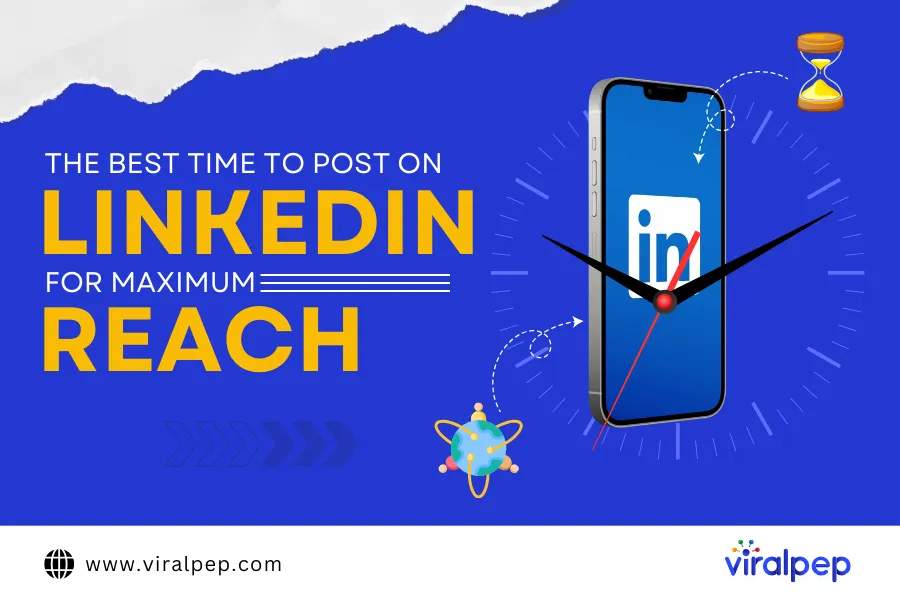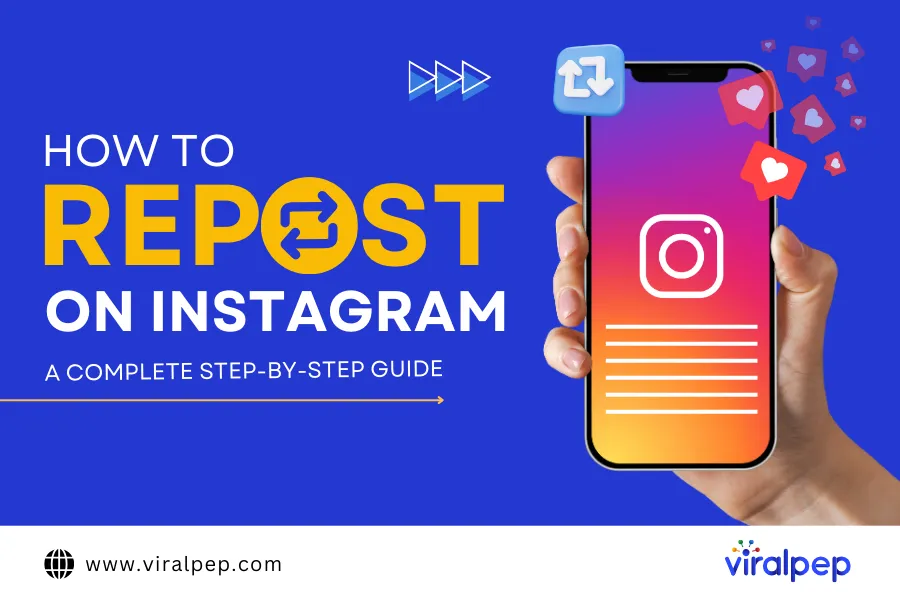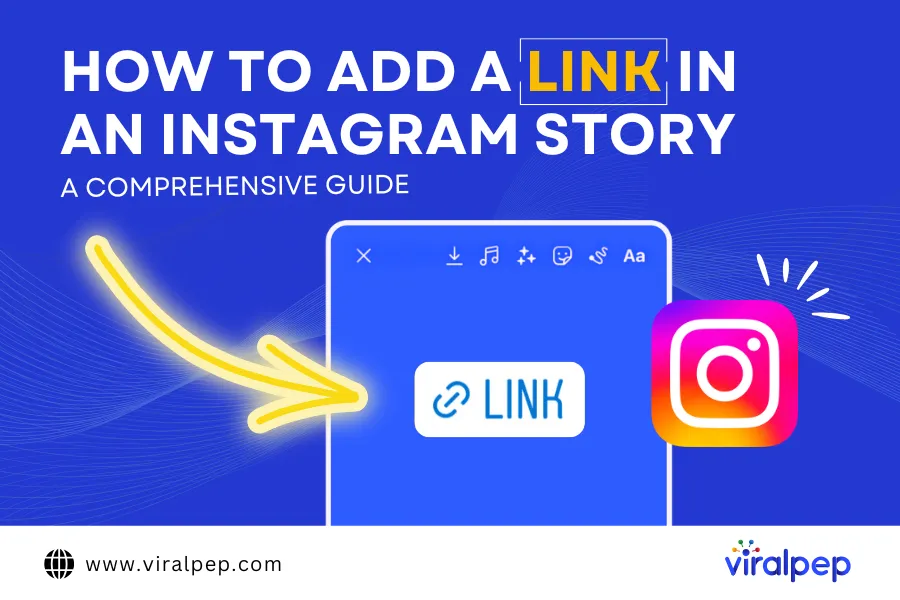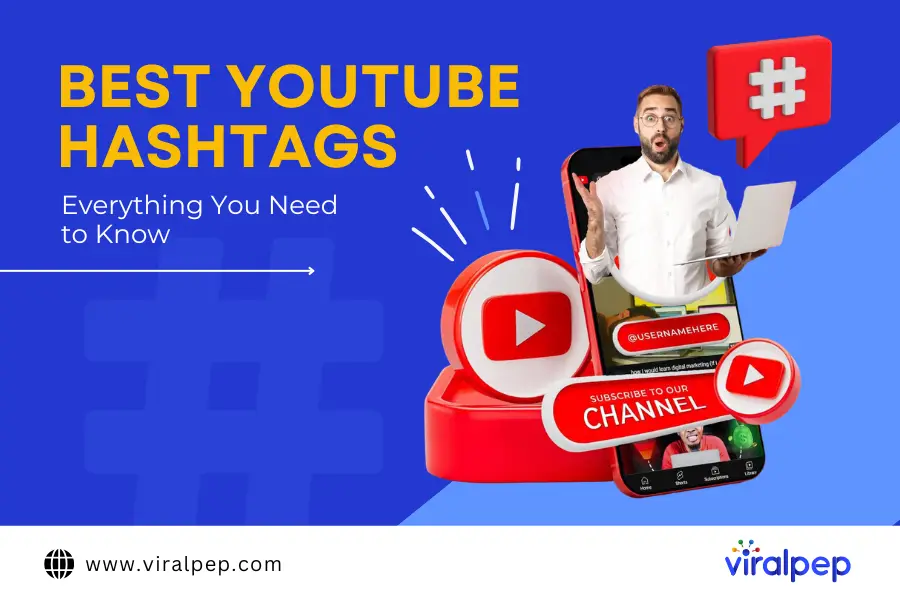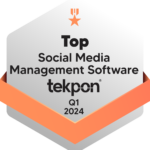Nowadays, in a fast-moving business world, companies have amped up marketing games with a variety of marketing tools coupled with AI. These digital tools bring a new stance to marketing by simplifying tasks, collecting useful user information, providing insights, and helping increase reach to foster impactful relationships with clients.
In this article, we’ll understand the top 10 marketing tools that you can leverage for your business growth and next-level exposure.
What are Marketing Tools?
Marketing tools are digital tools or software for advertising, research, lead generation, increased sales, etc. that help companies effectively reach their target audience. It also helps them get better insight into their user behavior and market to design their campaigns. From social media to maintaining customer relations, these tools help businesses deliver hyper-personalized services and stay ahead of the competition.
Why Choose These Marketing Tools?
Harnessing these digital marketing tools gets you benefits like:
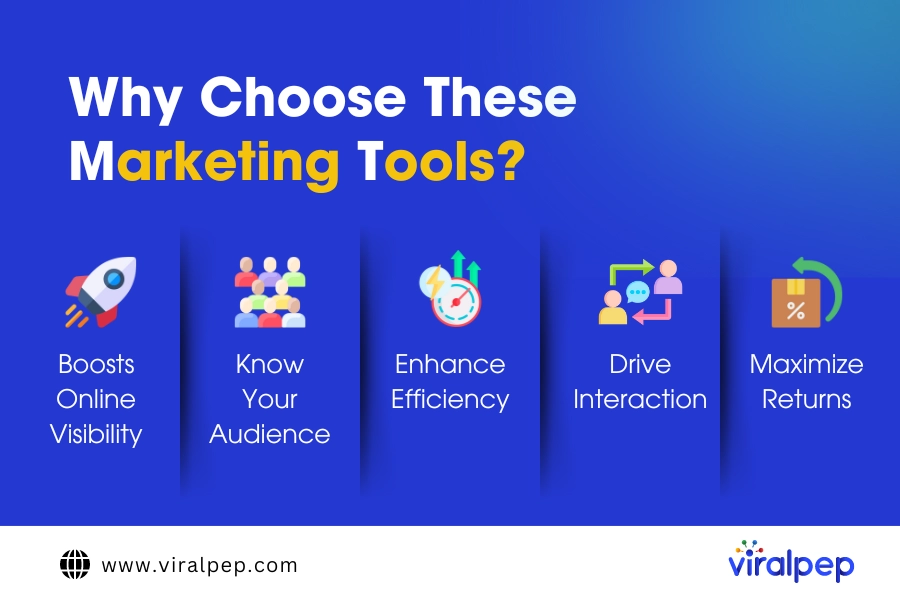
-
Boosts Online Visibility:
These marketing tools are SEO-friendly, cover many platforms, are feature-rich, and are engaging, increasing your presence online.
-
Know Your Audience:
It helps understand the audience’s preferences and personalize their approach to conversion.
-
Enhance Efficiency:
Automate workflow, plan content, and analyze data for smoother operation.
-
Drive Interaction:
Create content that attracts customer engagement and track metrics.
-
Maximize Returns:
Real-time analysis, data-driven methods, and optimized strategies result in increased ROI.
So, let’s look at the top marketing tools that you can use for your growth.
Top 10 Marketing Tools to Leverage for Your Business
-
Viralpep
An efficient, results-oriented, feature-rich social media management tool with a focus on efficiency and reliability. It is designed to simplify social media scheduling and posting across various platforms. Trusted by thousands of businesses to maximize their user engagement, it streamlines marketing efforts, ensuring a consistent social media presence.
Key Features:
- Comprehensive features for content and analytics.
- Content calendar for better organization.
- Post-preview functionality.
- Performance analytics for tracking engagement.
- User-friendly interface for seamless navigation.
Pros:
- Simplified, intuitive management of social media content.
- Collaboration and performance analytics.
Cons:
- Starting up may get a little complex.
- Advanced integration limitations.
Pricing:
Starts at $25 per month.
-
SEMrush
SEMrush is an SEO and SEM tool used and trusted by 7 million global marketers. Easy to use, it is a holistic digital platform for businesses to rule SERPs, increasing visibility and visitors for ROI.
Key Features:
- Comprehensive SEO with keyword research
- Competitor analysis and content optimization
- Backlink monitoring for site optimization
- Domain-specific content analysis.
- Tailored data reporting and market research.
Pros:
- A large database for more accurate results.
- Comfortable UI with a high level of functionality.
Cons:
- Starting up may get a little complex.
- Costly add-ons for more features
Pricing:
Free and paid plans starting at $129.95 per month.
-
Mailchimp
Mailchimp, a leading email marketing tool also used for advertising, is trusted by millions worldwide for its user-friendly interface and features to streamline email campaigns. With 300+ integrations. Mailchimp helps all types of businesses plan their email marketing campaigns to drive conversions and nurture leads.
Key Features:
- Drag-and-drop features to customize email templates
- Advanced audience segmentation options
- Triggered events to automate emails
- Detailed campaign analytics for revenue generation
- Integration with e-commerce platforms
Pros:
- Design professional landing pages
- Comprehensive analytics
Cons:
- Limited customization options for the free plan.
- Email scheduling is not available on the free plan.
Pricing:
One-month free trial and paid plans start at ₹385/month for 12 months.
-
Google Analytics
Google Analytics is a data and analytics tool, with nearly 50 million websites in the world using it. Backed by Google, it works wonders for small businesses, providing deeper insight into website traffic and user behavior to increase their conversion ratios.
Key Features:
- Real-time website data tracking
- Audience demographics and interests
- Behavior flow analysis
- Conversion tracking and traffic
- Customizable reporting and dashboards
Pros:
- Full reports about website performance, especially with WordPress and Wix.
- Enjoying utmost efficiency with plenty of functionalities.
Cons:
- Steep learning curve for beginners.
- Data overload results in complex navigation.
Pricing:
Free to use.
-
Hotjar
Hotjar is widely embraced by marketers as an e-commerce marketing tool for in-depth user behavior analysis and bounce rate reduction. Its capabilities include collecting direct feedback and other data to enable customer interaction, enhance service quality, and boost conversion rates. Businesses rely on features such as these to drive improvements in their operations.
Key Features:
- Heatmaps with visualization for user interactions.
- Session recordings to follow users’ behavior.
- Interacting with customers through questionnaires.
- User-friendly interface to navigate the website with ease.
- Advanced analytics for in-depth understanding.
Pros:
- Enables conversion funnels and behavior logic.
- Offers real-time session recordings.
Cons:
- Excessive user data increases complexity.
- It is difficult to set up.
Pricing:
Free-to-use and paid plans start at $32 per month.
-
Canva
Canva is a very well-known design and marketing tool that is best for small businesses and freelancers to help create amazing graphic materials meant for marketing without a background in graphic design. With more than 170 million users around the world, Canva is the must-have solution for myriad marketing content with user-friendly yet professional tools.
Key Features:
- Intuitive drag-and-drop interface.
- Thousands of customizable templates for business cards, banners, e-books, presentations, etc.
- Access to countless images and graphics.
- The brand kit is to define branding.
Pros:
- Collaboration features for team projects.
- Extensive templates and graphics library.
Cons:
- IP rights remain with Canva.
- You cannot move a design to another design.
- Some templates come with a cost.
Pricing:
Limited free version and paid plans start at ₹3,999/year for one person.
-
Google Trends
A popular SEO tool backed by Google is Google Trends, which helps track the popularity of search queries over time. With millions of users worldwide, it provides useful information regarding trending topics and search patterns, enabling marketers to roll out timely and relevant content strategies.
Key Features:
- Nowcasting of the internet searches in real-time.
- Comparison of keyword popularity.
- Regional interest insights.
- Related queries and topics.
- Historical data for trend analysis.
Pros:
- Know about trending topics for content generation.
- See which keyword is popular during a certain period.
Cons:
- Insufficient information on particular age groups and gender features.
- Trends can originate from and change due to various external factors.
Pricing:
Free to use.
-
BuzzSumo
BuzzSumo is a social media analytics platform for content marketing. Started in 2014, nearly 52% of businesses in the US are leveraging its vast data from over 6 social media platforms. Significantly, BuzzSumo caters to content creators, marketers, PR agencies and professionals, media managers, and publishers worldwide.
Key Features:
- Discover top-performing content, trendy topics, and keywords.
- Analyze metrics of social media engagement.
- Get influencers from your field in contact with your organization.
- Conduct backlink analysis.
Pros:
- Supports creating effective content strategies.
- Gives insights into competitor performance.
Cons:
- Can be intimidating for newcomers.
- Some of its latest tools are hard to learn.
Pricing:
Plans start at $199 per month.
-
LinkedIn Sales Navigator
LinkedIn Sales Navigator is a popular B2B sales tool used by many professionals as a way to find and contact the right prospects and decision-makers on LinkedIn. With 50 million users all over the world, it’s the place where any type or size of business can get the best results in digital marketing.
Key Features:
- Refined lead and business search.
- Real-time suggestions for leads.
- Direct outreach using InMail messaging.
- CRM integration to ensure smooth operations.
- Tools for sales teams for collaboration.
Pros:
- Unlimited reach to the desired audience.
- Accelerated tracking guarantees proper lead management.
Cons:
- High subscription cost.
- A deeper learning path for new users.
Pricing:
Plans start at $99 per month.
-
Salesforce
Salesforce is a popular all-in-one customer relationship management (CRM) suite that offers a variety of cloud-based tools for your endless marketing needs. It helps in centralizing customer data, coordinating sales processes, and tailoring marketing for your specific audience.
Key Features:
- High integration with over 1000 platforms and third-party apps.
- Large ecosystem of pre-built components and apps.
- Real-time analytics and reporting.
- Resolves ineffective sales processes and lead management, limited analytics, scalability, and flexibility.
Pros:
- Simple setup and functionalities.
- It is easy to find tech support due to its vast popularity.
Cons:
- No control over its downtime or updates.
- Costly plans make it unaffordable for small- and mid-size businesses.
Pricing:
Starts at $24 per month.
Conclusion
These top 10 marketing tools meet various marketing demands of the time, providing valuable solutions that drive business success. They have become crucial in the digital world for wider business reach, effective marketing, and assured ROI. So, improve your sales with a personal touch and effective engagement.


